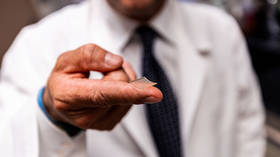University of Pittsburgh touts flu-like vaccine against Covid-19, says it works on mice

Researchers at the University of Pittsburgh in Pennsylvania say they may have a vaccine against the coronavirus, and a novel painless method to deliver it. It is currently being tested on mice with promising results.
Delivered through a fingertip-sized patch, the vaccine produces antibodies specific to the SARS-CoV-2 “at quantities thought to be sufficient for neutralizing the virus,” the university said in a statement on Thursday.
“We knew exactly where to fight this new virus,” said doctor Andrea Gambotto, one of the senior authors of the study about the new vaccine published in EBioMedicine, an imprint of The Lancet. Drawing on experience with the SARS and MERS coronaviruses in 2003 and 2014 – close cousins of the virus causing Covid-19 – the researchers zeroed in on a spike protein that is key to inducing immunity, he explained.
Today, University of Pittsburgh School of Medicine @PittHealthSci scientists announced a potential vaccine against SARS-CoV-2, the new coronavirus causing the #COVID19 pandemic. https://t.co/ILW4IQfou7pic.twitter.com/Y7l0SifBtn
— UPMC (@UPMCnews) April 2, 2020
When tested on mice, the Pittsburgh Coronavirus Vaccine – PittCoVacc – generated “a surge of antibodies” within two weeks. While the test animals are still under observation, researchers say they “seem to be following the same trend” as mice who received the MERS vaccine, who produced antibodies sufficient to ward off the virus for a year, similar to the seasonal flu shot.
To increase the potency of the vaccine, spike protein pieces are supposed to be delivered via a patch made up of 400 microneedles, which dissolve right into the skin.
“It’s actually pretty painless – it feels kind of like Velcro,” said Dr. Louis Falo, professor and chair of dermatology at Pitt’s School of Medicine and UPMC.
Also on rt.com First vaccine trial for Covid-19 has begun – WHOThis is just the latest in about half a dozen or more proposed vaccines against the novel coronavirus, which has infected close to a million people around the world and killed over 50,000 since it emerged in China last December.
The World Health Organization announced the first vaccine candidate back on March 18. Oxford University in the UK sought volunteers for clinical trials on March 27. Monash University in Melbourne, Australia said on Wednesday they were conducting animal trials on three different proposed vaccines, while Russian authorities said the first phase of their vaccine candidate was completed on March 23.
Also on rt.com Russian coronavirus vaccine passes first phase of development - expected to be ready in '11 months'
Governments across the world have been caught unprepared for the spread of Covid-19, which was officially declared a pandemic on March 11. Even though many peacetime safety regulations have been waived to speed up the development of both vaccines and treatments, public health experts have predicted the first approved inoculations will not be available before sometime in 2021.
Think your friends would be interested? Share this story!













